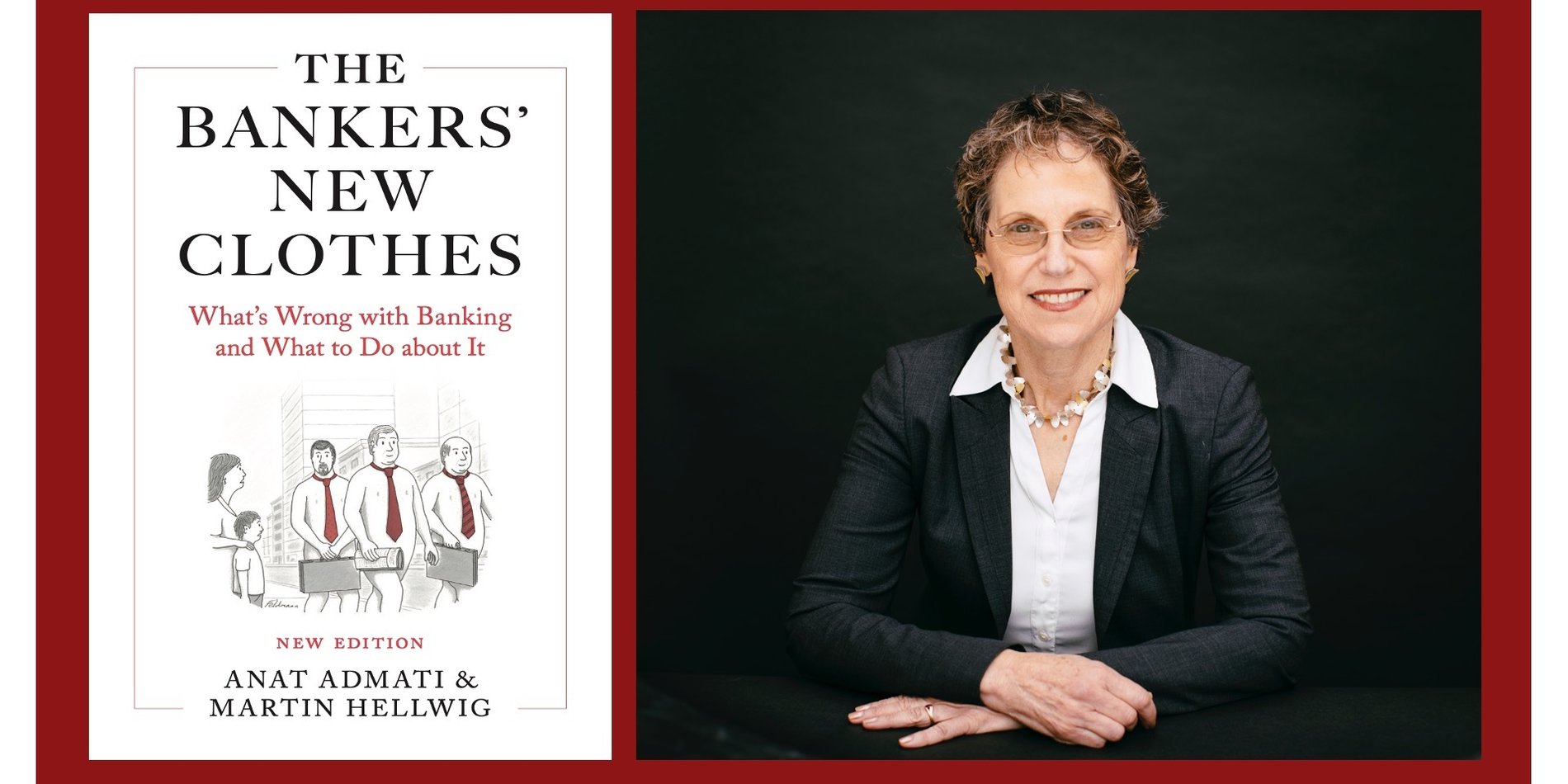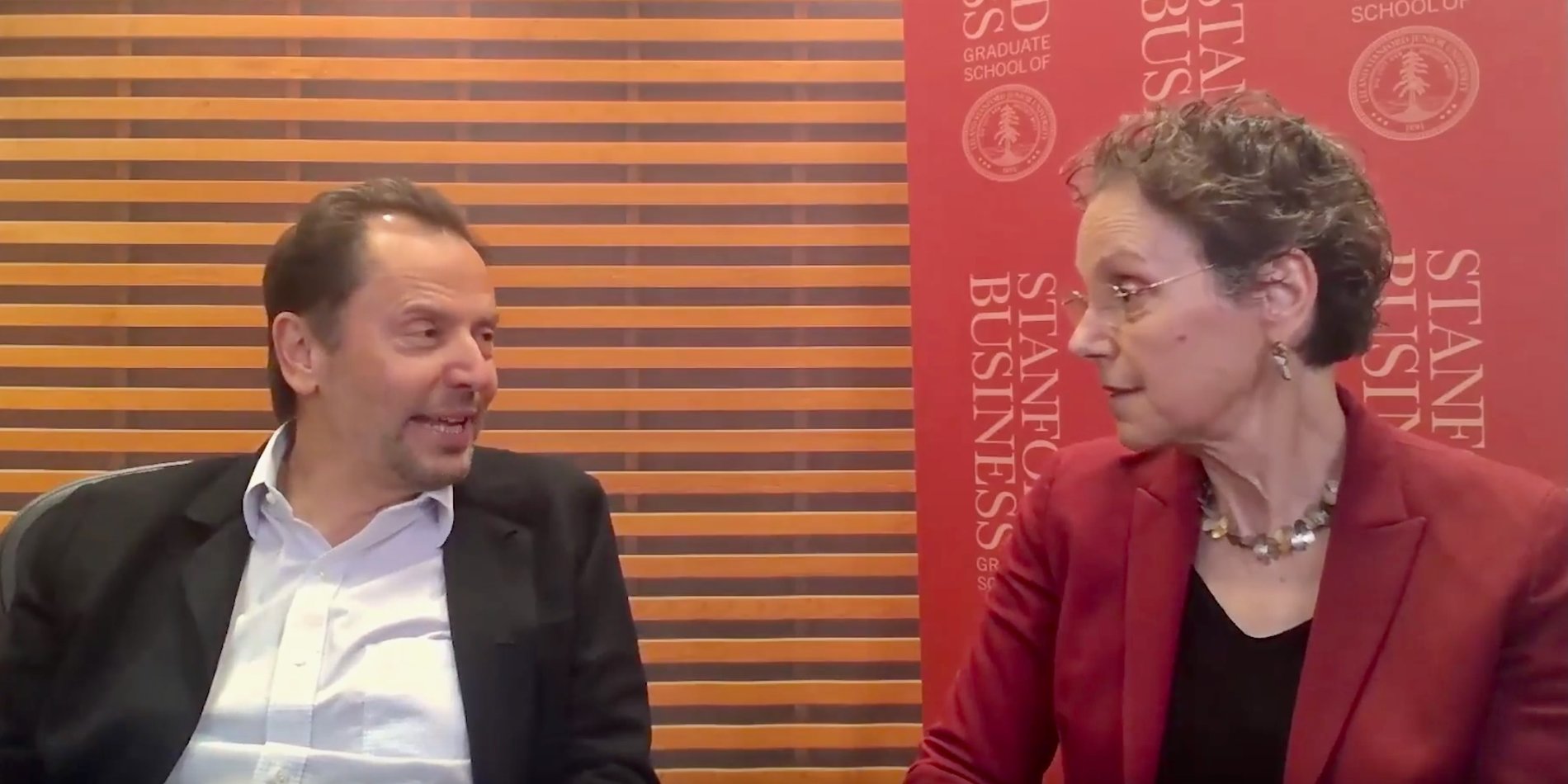The Inside Scoop on the SEC with Former Commissioner Allison Herren Lee
Watch the Event
Elon Musk, insider trading, the crypto meltdown, and SPACs. Some of today’s biggest financial news stories involve the Securities and Exchange Commission, the nearly 80-year-old federal agency responsible for regulating securities and protecting investors. At Stanford Graduate School of Business, former SEC Commissioner Allison Herren Lee shared an insider’s perspective on the SEC in an informed and revealing discussion.
The January 26 event, sponsored by the Corporations and Society Initiative, was moderated by CASI’s faculty co-director Professor Anat Admati, who is currently teaching a course on Power in Finance with GSB lecturer Heiner Schulz. Admati began the discussion with a look back at Bernie Madoff, a titan of Wall Street who was convicted for operating what many consider the biggest Ponzi scheme in history and defrauding thousands of investors out of more than $60 billion. A new Netflix docuseries series exposes Madoff’s shocking crimes and offers a critical portrayal of a too-cozy SEC asleep at the wheel.
“How come the SEC couldn’t have seen this, despite for 10 years being warned about Madoff?” Admati asked. “Madoff was very close to the SEC. He was revered, a big shot in the financial sector.”
“Could that happen again today?”
Herren Lee began by telling the audience that she was working in the Enforcement Division’s Denver office when the Madoff story happened and was not connected in any way. However, she did not believe that Madoff’s connections and influence were the reasons the SEC failed to uncover his crimes.
She said that “they weren’t looking the other way because he was powerful.” Instead, she believes SEC investigators made assumptions about Madoff based on the markers of his success. “That does happen, and that can happen again.”
Herren Lee said many regulations have been put into place to correct the errors and the gaping holes, especially in the area of broker-dealer custody practices.
“As with any scheme or any other kind of regulatory approach, we’re always addressing what happened before, and so that will fix some of it. But there will always be more creative people and more ways to get at it, so I hope we don’t see that again. But I think the ingredients of what occurred there could certainly resurface in a different way.”
Admati then turned to issues of enforcement and the long-running battle between another powerful figure, Elon Musk, and the agency. In 2018, the SEC charged Musk with securities fraud when, during a now famous tweet, he told his 22 million Twitter followers that he had "funding secured" to take Tesla private at $420 a share. That caused the stock price to jump, but when the funding wasn’t there, it dropped, causing some investors to lose millions.
Over the last four years, Musk has openly mocked the agency and claimed he’s been the target of unrelenting harassment. Recently, after his acquisition of Twitter, the SEC launched an investigation into a late disclosure notice by Musk regarding the size of his Twitter stake, a delay that saved him more than $140 million.
Before specifically addressing the 2018 case involving Musk and the SEC, Herren Lee gave some background on Rule 10b5-1 a regulation under the Securities Exchange Act of 1934 that targets securities fraud. Late last year, the SEC updated the rule to strengthen enforcement. She pointed out that the case against Musk for his false tweet statement was clearly a violation of the SEC rule, or what she termed “garden-variety fraud.”
“Obviously he’s an unusual case, because this is a man who can move markets with a three-word tweet, and not all of us can do that, or would if we could.”
Herren Lee said she felt Musk’s rhetoric and public views were more "theatrics and a sideshow" and she doesn’t believe it impacts how the staff approaches the way they deal with him.
“All of that said, he has massive resources,” she readily admitted. “If you’re massively resourced the way someone like Elon Musk is, those cases are harder. They require more resources. They require us to be able to draw from all the different areas of the agency, to understand how to go forward. And the staff is almost always, although they do an amazing job, they’re outgunned.”
Herren Lee finished with a comment on the latest investigation into Musk regarding his stake in Twitter and the disclosure delay. She explained that when you are accumulating stock and cross the 5% threshold of holding the company’s common shares, you are required to disclose your holding by filling out a Schedule 13D form within 10 business days. Whether intentional or accidental, Musk could be facing another long investigation.
“They have to treat it the same way as they would anyone else,” she said, “and I have no doubt that they will.”
Admati also asked Herren Lee about the public comments period that accompanies the rule-making process at federal agencies like the SEC. Admati explained how she personally became involved in policy input in Washington, D.C., when regulatory banking reform was a major issue after the global financial crisis more than a decade ago.
“If you look at who submits comments,” Admati remarked, “it’s the people who will care about the rules.” She explained that often academics are paid by people with vested interests in the rules. She asked Herren Lee how policymakers can discern when information is biased or false.
“How do they protect from that? How do they get good information, unconflicted information?
Herren Lee described how agencies like the SEC are required under the Administrative Procedure Act to seek notice and comment before they make a final rule.
“I think a lot of people think that those comment letters just go into this void,” she said, but she made it clear that they don’t. “We really genuinely depend on that type of information, and we almost always make changes between proposal and final based on the input that we get.”
She explained that she and other policymakers were well aware of the incentives behind many of the comment letters, but she felt those were natural incentives born out of the need to protect business models. She admitted it took a great deal of work to analyze the comments and take in what is considered helpful, informative comments that can potentially change the approach.
“I will say that I’ve learned an amazing amount over the years, and especially in my role as a commissioner, from reading people like you, Anat, and the work that you’ve done. I’ll read the scholarship regardless if it’s related, even if it’s not been submitted as a comment letter, as did many of the other commissioners, but it has a real impact.”
Admati opened the discussion to questions from the audience. Herren Lee spoke on several different topics from insider information and insider trading to climate risk disclosures, and the rise and fall of special purpose acquisition companies, or SPACs. One audience member asked how the push for regulating cryptocurrencies will play out given the competing regulatory frameworks at different agencies. While Herren Lee said she didn’t see a "turf war" between regulators, what she sees is the need to help the people who are working on innovative digital assets understand whether they are dealing with a security versus a commodity or something completely different.
“Many of these coins that I’ve looked at seem to me to be quite obviously securities where, if you got good advice from a good lawyer, they would be able to tell you that. But I don’t think that's always true so that to me is the tricky part, making sure folks have enough information to know the difference.”
Herren Lee also said while Congress should weigh in on the crypto industry, she would not support removing regulatory oversight from the SEC for any asset that meets the traditional definition of a security.
Admati wrapped up the discussion with a final question for Herren Lee; as an expert in this area, and a former policymaker, what would she want to say to the MBA students here? What would be the takeaway?
The former commissioner was quick to reply that the students are “the future of what happens in corporate America and don’t undersell that. Get involved in shaping the things that you think will protect the values that you think are important in society. You can play a much bigger role than you realize.”
She emphasized her love of public service. “It’s been the best job of my life by far. It's important work, and it’s gratifying work. So I encourage you all to think carefully about the choices that you make, and find that thing that ignites your passion, and think about public service.”



